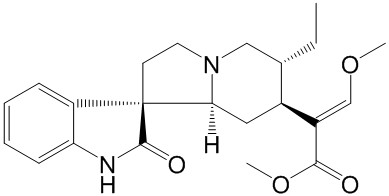Home
Products
Rhynchophylline



| Product Name | Rhynchophylline |
| Price: | $92 / 20mg |
| Catalog No.: | CN02083 |
| CAS No.: | 76-66-4 |
| Molecular Formula: | C22H28N2O4 |
| Molecular Weight: | 384.47 g/mol |
| Purity: | >=98% |
| Type of Compound: | Alkaloids |
| Physical Desc.: | Powder |
| Source: | The herbs of Uncaria rhynchophylla. |
| Solvent: | Chloroform, Dichloromethane, Ethyl Acetate, DMSO, Acetone, etc. |
| SMILES: | COC=C(C1CC2N(CC1CC)CCC12C(=O)Nc2c1cccc2)C(=O)OC |
| Contact us | |
|---|---|
| First Name: | |
| Last Name: | |
| E-mail: | |
| Question: | |
| Description | Rhyncholphylline, an alkaloid isolated from Uncaria, shows potent inhibition of lipopolysaccharide (LPS)-induced NO production in rat primary microglial cells.IC50 value:Target:In vitro: Rhyncholphylline effectively suppresses release of proinflammatory cytokines in LPS-activated microglial cells and the underling molecular mechanism for the inhibition of microglial activation; Attenuated LPS-induced production of proinflammatory cytokines such as TNF-α and IL-1β as well as NO in mouse N9 microglial cells [1]. Rhynchophylline exerts it protective action against ischemia-induced neuronal damage by preventing NMDA, muscarinic M1, and 5-HT2 receptors-mediated neurotoxicity during ischemia [3].In vivo: The neuroprotective effect of rhynchophylline was investigated in a stroke model. Following pMCAO, rhynchophylline treatment not only ameliorated neurological deficits, infarct volume and brain edema, but also increased claudin-5 and BDNF expressions (p < 0.05). Moreover, rhynchophylline could activate PI3K/Akt/mTOR signaling while inhibiting TLRs/NF-κB pathway [2]. |
| Density | 1.2±0.1 g/cm3 |
| Boiling Point | 560.8±50.0 °C at 760 mmHg |
| Flash Point | 293.0±30.1 °C |
| Exact Mass | 384.204895 |
| PSA | 67.87000 |
| LogP | 3.31 |
| Vapour Pressure | 0.0±1.5 mmHg at 25°C |